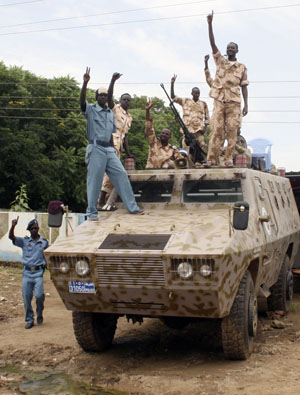
JUBA, South Sudan — Sudan Armed Forces, or SAF, have taken control of the stronghold of the rebel Sudan People’s Liberation Army-North, or SPLA-N, in Kurmuk town, near the Ethiopian border.
The Sudanese government has long announced a military offensive to take over the SPLA-N’s main base in Blue Nile state. Sudanese President Omar al-Bashir told the media two days ago that his forces are determined to perform Eid al-Adha prayers in Kurmuk. A statement by the Sudan Armed Forces announcing the takeover of Kurmuk reiterated that goal, commending SAF soldiers and members of government-aligned militias for “fulfilling the promise.” The SAF statement, translated into English by Harvard Humanitarian Institute, closed with the vow that “the process to eliminate the remnants of the SPLM continues.”
Tracking the build-up of heavy weaponry near Kurmuk, the Satellite Sentinel Project has also warned about an imminent attack on the town, stressing that this attack may “result in the use of indiscriminate and disproportionate force” against civilian population, by SAF and affiliated militia groups.
Yasir Arman, SPLM-N secretary-general and spokesperson, told the Enough Project today that “nothing has changed” and that “before or after Kurmuk, the struggle will continue.” He noted that during the previous war against the government forces Kurmuk “has exchanged hands between the government forces and SPLA five times” over the years. Arman is convinced that Khartoum is repeating mistakes from the past, emphasizing that the SPLA-N still controls a large swath of Blue Nile state.
Over the course of the conflict in Blue Nile, which erupted in September, Yasir Arman has previously told the Enough Project, “The government forces can win the battles but never the war.” He went on to say, “The issue is still there, people demand justice and democracy and this conflict will not be solved by military means.” According to Arman, fighting will continue in Nuba Mountains, Blue Nile, and Darfur as long as the government continues “producing marginalization.” He added, “The war will never end if there is no real reform in Khartoum.”
Sudanese refugees who fled over the border into Ethiopia recently described to Enough what they said was the deliberate targeting of civilians.
“Soldiers with small arms were chasing the civilians. They were supported by the Fellata [an ethnic group in Blue Nile], who captured some of the civilians and slaughtered people,” said Asma, who witnessed the outbreak of conflict in the town of Um Darfa.
Arman says that protection of civilians is urgent priority.
Some media outlets have reported that SAF in Blue Nile is allegedly using chemical weapons against the SPLA-N and the civilian population. Arman said he could not confirm these allegations but added that “Khartoum has never fought a clean war and anything could be expected.”
Since the first attacks in Damazin by SAF forces, the Blue Nile war has had grave implications for the civilian population. Aerial bombardments and fighting have displaced hundreds of thousands within the state, while an estimated 29,000 have fled across the borders to Ethiopia and South Sudan. The Sudanese government has been preventing humanitarian access into Blue Nile; by extending its control over more territory in Blue Nile, the humanitarian crisis will likely worsen.
According to UNHCR, very few refugees were seen this morning in Kurmuk town, on the Ethiopian side. Kurmuk, Ethiopia, which lies a short distance across the border from Kurmuk, Sudan, has been the busiest border entry point for Sudanese refugees since conflict broke out. A team is on the ground right now further assessing the situation, UNHCR said.
Amanda Hsiao contributed to this post.
Photo: SAF soldiers in Damazin in September (AP)

